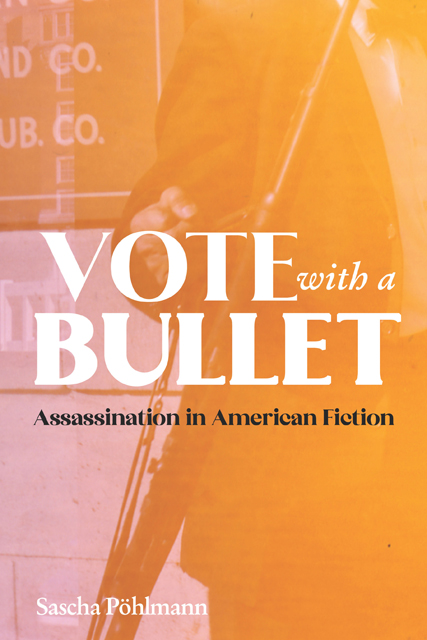Book contents
- Frontmatter
- Dedication
- Contents
- Introduction: The Individual and Society
- 1 The Princess Casamassima (1886)
- 2 The Assassination Bureau, Ltd. (1910/63)
- 3 All the King’s Men (1946)
- 4 Solar Lottery (1955)
- 5 The Manchurian Candidate (1959)
- 6 The Parallax View (1970)
- 7 Libra (1988)
- 8 The Dead Zone (1979)
- 9 11/22/63 (2011)
- 10 Big If (2002)
- 11 Checkpoint (2004)
- 12 The Good Father (2012)
- Conclusion
- Works Cited
- Index
5 - The Manchurian Candidate (1959)
Published online by Cambridge University Press: 14 January 2023
- Frontmatter
- Dedication
- Contents
- Introduction: The Individual and Society
- 1 The Princess Casamassima (1886)
- 2 The Assassination Bureau, Ltd. (1910/63)
- 3 All the King’s Men (1946)
- 4 Solar Lottery (1955)
- 5 The Manchurian Candidate (1959)
- 6 The Parallax View (1970)
- 7 Libra (1988)
- 8 The Dead Zone (1979)
- 9 11/22/63 (2011)
- 10 Big If (2002)
- 11 Checkpoint (2004)
- 12 The Good Father (2012)
- Conclusion
- Works Cited
- Index
Summary
The characters in the next novel under consideration, Richard Condon’s thriller The Manchurian Candidate (1959), can only dream of the degree of agency portrayed in Solar Lottery. In Condon’s novel, the assassin is not even granted agency enough to have a sense of agency panic, since he is controlled by outside forces to such an extent that he does not even recognize it, and his violent intervention into politics by extra-electoral means occurs far beyond any individual choice. The Manchurian Candidate is in fact particularly extreme in its extinction of the personality of the unwitting assassin Sergeant Raymond Shaw. Shaw and his platoon, including his later antagonist Colonel Bennett Marco, are captured by Soviet forces during the Korean War, and they are taken to Manchuria to be brainwashed by the Chinese expert Yen Lo. They return to the United States believing that Shaw committed an act of heroism to save their lives, for which he is awarded the Medal of Honor. Years later, Marco’s mental conditioning wears off, and he begins to suspect that he and Shaw were brainwashed. His investigation takes him close to Shaw again, and he discovers that his former comrade is actually a sleeper agent ready to become an assassin for the KGB. While the Russians are in the background of the conspiracy, its main agent in the United States is actually Shaw’s mother Eleanor, who is married to Senator John Iselin. Her plan is to have Shaw shoot the presidential candidate at a party convention so that her husband can succeed him. Marco, however, manages to change Shaw’s conditioning, having him shoot Eleanor and Iselin before turning the gun on himself and committing suicide.
As even this brief plot summary suggests, The Manchurian Candidate is as much a novel of its time as Solar Lottery, a “true artifact of Cold War culture” (Menand) and the Red Scare, when American individualism was pitted against Soviet communism and when paranoia reigned supreme so that, in a painful destruction of the Emersonian ideal, one might not even trust oneself any longer. Yet the novel also thoroughly subverts the ideology of a good United States of America threatened by an evil Russia by presenting the corruption of the American political system by McCarthy-like demagogue Iselin and his wife. While he is merely a cynical politician, she is the real actor pulling various strings.
- Type
- Chapter
- Information
- Vote with a BulletAssassination in American Fiction, pp. 83 - 90Publisher: Boydell & BrewerPrint publication year: 2021

